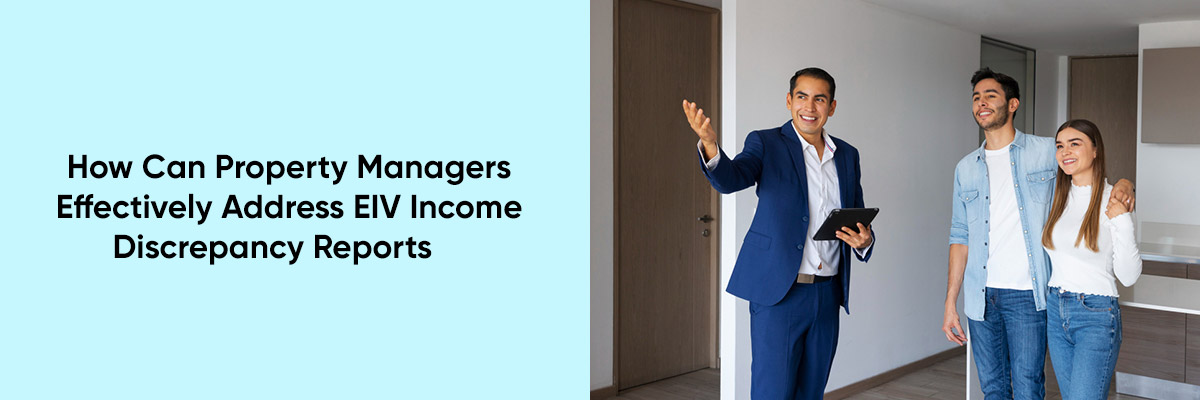For property managers overseeing housing under federal assistance programs, handling EIV (Enterprise Income Verification) Income Discrepancy Reports is integral to maintaining program integrity.
These reports serve as crucial tools in identifying discrepancies in reported tenant income. Addressing these discrepancies effectively requires a structured approach and clear understanding.
Here’s a comprehensive guide on how property managers in the US can navigate and manage these reports adeptly.
Understanding EIV Income Discrepancy Reports
The EIV Income Discrepancy Report is a document generated within the Enterprise Income Verification (EIV) system utilized by the US Department of Housing and Urban Development (HUD).
Property managers need a thorough grasp of EIV reports, including how they are generated, what information they contain, how to read EIV income discrepancy reports, and their significance in maintaining compliance with federal regulations.
The primary purpose of the EIV Income Discrepancy Report is to identify discrepancies or inconsistencies between the income reported by tenants and the information available from federal databases. It helps housing agencies and property managers detect discrepancies in reported incomes, which could indicate errors, omissions, or discrepancies that need further investigation.
The report typically includes:
- Tenant Information: Details such as names, unit numbers, and Social Security numbers of tenants receiving housing assistance.
- Reported Income Sources: It lists the different sources of income reported by tenants, including wages, unemployment benefits, Social Security payments, etc.
- Discrepancies: Any disparities between the reported income by tenants and the data obtained from federal sources are highlighted. These discrepancies may require further verification or documentation.
Property Managers Can Effectively Address Income Discrepancy Reports:
- Accessing and Reviewing Reports:
You should ensure authorized access to the EIV system and regularly review the Income Discrepancy Reports. Familiarize yourself with the layout, tenant information, reported income sources, and highlighted discrepancies so that you can fix EIV discrepancies.
- Communicating with Tenants:
You should promptly communicate any identified discrepancies to tenants. Maintain transparency and explain the necessity of resolving these issues to comply with program regulations. Also, you should encourage tenants to provide necessary documentation or clarification to reconcile discrepancies.
- Documenting and Verifying Income:
Request supporting documentation from tenants to validate reported income. This may include pay stubs, tax returns, bank statements, or other relevant proofs. Establish clear protocols for accepting and verifying documentation.
- Collaboration and Compliance:
Collaborate with relevant stakeholders, including housing agencies, legal advisors, and HUD representatives, to ensure compliance with federal regulations while addressing discrepancies. Stay updated with HUD guidelines and policies related to EIV reporting.
- Resolving Discrepancies:
Once documentation is received, review and assess the validity of the provided information. If discrepancies stem from errors or omissions, adjust assistance accordingly following HUD guidelines. Ensure all actions taken are compliant and well-documented.
- Training and Education:
Regularly train property management staff on EIV policies, procedures, and compliance requirements. This empowers the team to accurately enter data, identify discrepancies, and effectively address them while adhering to regulations.
- Periodic Review and Monitoring:
Implement a system for periodic review of EIV reports to identify trends or recurring issues. Continuous monitoring helps in the early detection of discrepancies and timely resolution.
- Data Security and Confidentiality:
Adhere to strict data security measures to safeguard sensitive tenant information within the EIV system. Ensure compliance with privacy regulations and only share information as permitted by law.
- Continuous Improvement:
Regularly assess and refine internal processes for handling EIV reports. Emphasize continuous improvement to streamline operations and enhance accuracy in addressing income discrepancies.
End Note:
Effectively addressing EIV Income Discrepancy Reports is essential for property managers involved in federally assisted housing programs. By comprehensively understanding these reports, maintaining clear communication with tenants, collaborating with stakeholders, and adhering to compliance requirements, property managers can navigate EIV discrepancies adeptly, ensuring the integrity and effectiveness of housing assistance programs.
Always consult HUD guidelines and legal advisors for specific guidance on handling EIV reports and related procedures, ensuring alignment with current regulations and best practices.


